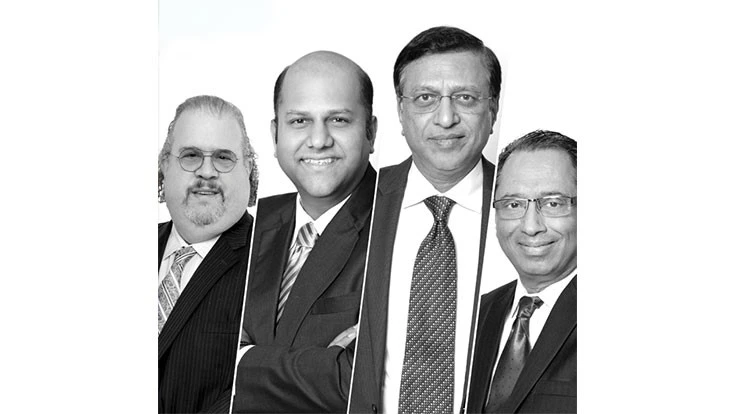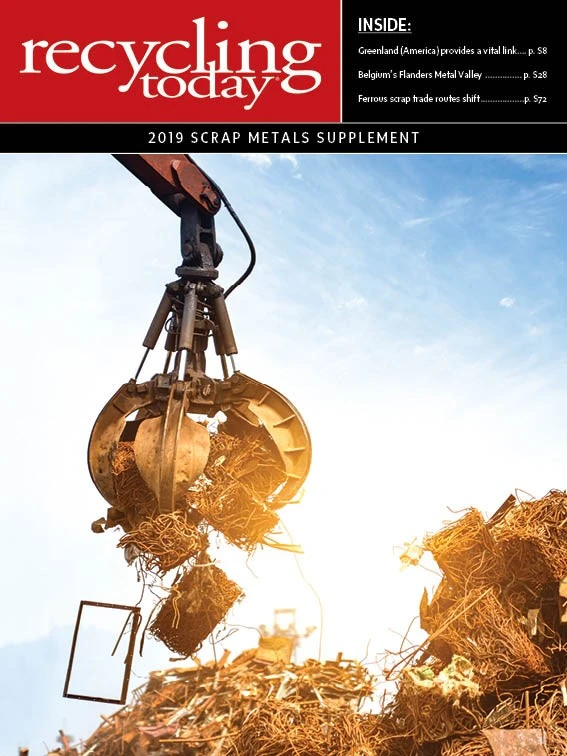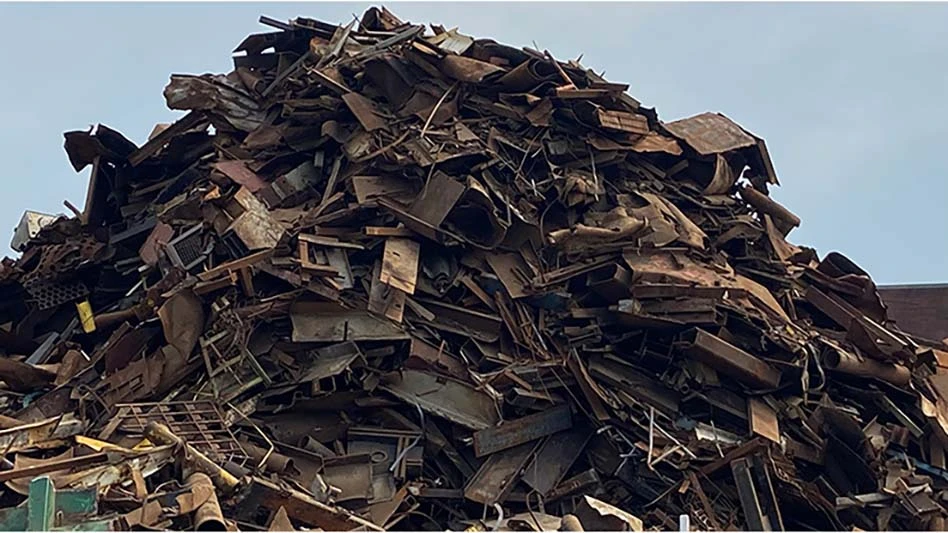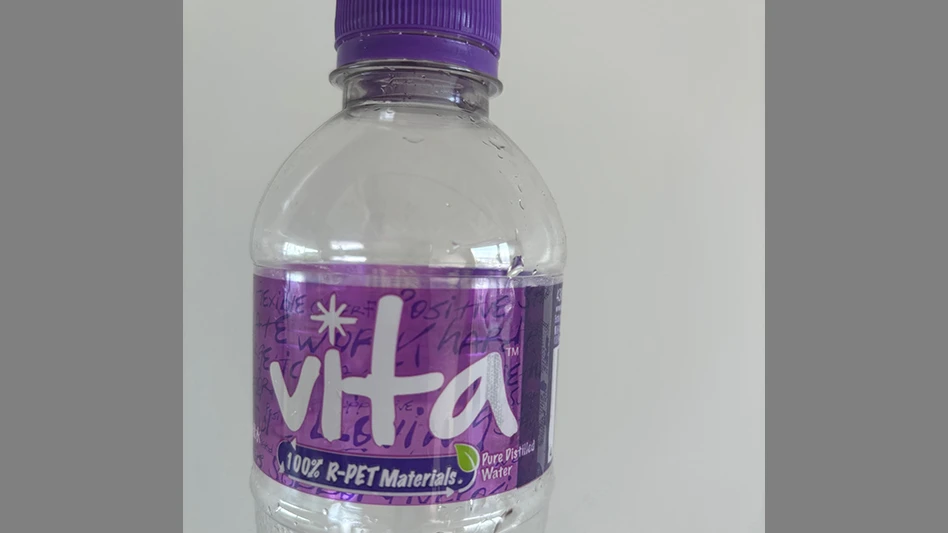
_fmt.png)
Scrap processors sometimes view brokers with suspicion, seeing them as a “necessary evil.” However, Randy Goodman, executive vice president of Greenland (America) Inc., a scrap brokerage firm headquartered in Roswell, Georgia, says brokers can offer a great deal of value to scrap processors, particularly in today’s global marketplace.
Goodman admits that he initially shared this suspicious view of these industry intermediaries when he was working in nonferrous scrap marketing roles for a number of scrap processors. However, about 10 years ago, Goodman says he came to appreciate the role brokers play. Today, he says, they are increasingly important as China continues to lessen its nonferrous scrap imports and processors look for alternative markets.
When it comes to trading with China, he says, “If you are a very large company and have a large export presence, you can put boots on the ground and sell direct in most cases.” Goodman adds that learning the nuances between north and south within China is relatively easy.
However, today’s market requires exporters to have a much broader knowledge base. Instead of knowing the distinctions of doing business in China, exporters must be familiar with the particulars of trading with 10 countries.
“On the export side, we can take a lot of the risk off and do the research they don’t have the wherewithal to do,” Goodman says of Greenland’s role. “We have access to countries and homes that they haven’t even begun to understand.”
Playing to its strengths
Goodman says Greenland’s strengths include its ability to move scrap globally in response to the changing marketplace. Those strengths are the result of the company’s relationships “and the fact that we have employees out there who are going to areas that are developing around the world based on the consumption of scrap,” he says.
Ganesh Jatia founded Greenland (America) Inc. in 1980. The company is in its third generation of family management, with Suresh Jatia, Ganesh’s son, currently serving as CEO, and Vishal Jatia, Ganesh’s grandson, serving as president.
Greenland operates satellite offices in Guangzhou, China, and in Mumbai. “The India and China offices are responsible for the sales, after-sales service, collections and liaisoning with the buyers,” Suresh says. “In the India office, back office operations for logistics and documentation are also carried out by a team of well-trained people who work U.S. hours.”
Vishal, who has worked out of Mumbai since 2010, joined Greenland (America) in 2004, the year after the company opened its office in Shanghai, which has since been relocated to Guangzhou. At that time, Greenland was handling less than 1,000 metric tons per month. Now, nearly 15 years later, the company handles more than 15,000 metric tons of nonferrous scrap per month, he says.
“I have seen a remarkable change in the last 15 years that I have been involved in the business,” Vishal says. “I remember starting out in the basement of our home in Atlanta with just two people to manage the documentation and paperwork.”
He describes his role with the company as coordinating between the purchasing and sales sides of the business to make sure things are running smoothly.
Goodman joined the company in the spring of 2015. He says that while he was considered to be experienced in trading with Chinese companies, he understood that he was “a one-trick pony” and that China’s attitude toward scrap imports was changing. “I knew that China would not be a sustainable business model,” he adds.
This reasoning factored into his decision to join Greenland (America).
“Greenland had the best presence globally and the best logistics and documentation,” Goodman says. “I was a customer of theirs before I joined the company. They seemed to really care more than others about their suppliers.”
Vishal says adding Goodman and two other traders—Scott Greenberg and Dan Przybeck—in the U.S. office has allowed him to focus on other countries. “In the last two years, we have set up operations in Australia and U.K. and expanded our buyer base to many new countries, which has enabled us to further increase our volumes.”
He continues, “Our vision is to be a global player, both in terms of buying and selling, so we can provide maximum value and real-time market intelligence to our suppliers and buyers. In this ever-changing dynamic environment, you never know when government policies may suddenly change or when the next trade war will begin. Hence, it is very important to diversify and have your eyes and ears on the ground in the markets you want to do business in. This is truly what differentiates us.”
Among the countries Greenland sells into are India, China, Pakistan, Greece, Korea, Japan, Taiwan, Malaysia and Thailand. Vishal credits Executive Vice President Ganesh Kedia for connecting with buyers around the world.
“We generate a daily buying price list for all nonferrous items and circulate it to all our suppliers in the U.S.,” Vishal says. “We have a strong sales network in various countries and can obtain daily bids from our buyers for almost all the different nonferrous metal scraps and are in a position to offer the top dollar to our suppliers.”
Specializing in service
Most of the scrap the company exports is in the form of nonferrous or specialty ferrous grades. However, Greenland does not see itself as specializing in certain grades but in “export and the fact that we have a large logistics and documentation team and great customer service throughout the sale,” Goodman says.
“We have found that all metals’ supply and demand ebb and flow, and to help a trading company manage those highs and lows, diversification of commodities covered and ability to have homes around the world is key,” he adds. “We are very well- positioned with aluminum, copper, lead, zinc and stainless. Certain items are tougher to move, and there are others that we have better access to markets.”
The company’s management team feels Greenland (America) can provide its buyers and sellers with the best experience when it comes to handling their needs.
Vishal says, “Many suppliers compliment us from time to time for our quick responses with regard to confirming purchases, providing a booking when the supplier wants to deliver the goods, putting out fires with regard to container shortages, timely payments and providing proper and factual feedback with evidence in case of any quality of weight shortage issues that our buyers encounter.”
He says the company’s Mumbai office runs three shifts. The night shift works U.S. hours and manages the entire logistics and documentation process, while the other two shifts manage trading in Asia, Australia and U.K. / Europe. “This has really been the backbone of our company,” Vishal adds. “Having a strong team and infrastructure is the most important thing as there are so many moving parts and it is very easy to overlook something that can prove to be very costly.”
Greenland’s physical presence in India and China enables its staff to easily investigate problems encountered at its buyers’ locations, gathering evidence to share with its sellers. The company does not rely on photos but investigates issues in person.
Though export sales account for nearly 90 percent of Greenland’s business to date, the firm added domestic scrap brokerage services roughly two years ago, Goodman says. Greenland saw an opportunity in the market at that time with the addition of Przybeck, who had relationships in the domestic and international aluminum scrap consuming sectors.
In serving the domestic market, Goodman says, “We took the exact same logistics prowess and payment advantages and put them to work.” He explains that Greenland pays within a day or two of the customer taking delivery of the material. “Most domestic mills for aluminum are at 40-, 45-, 60-day payment terms.”
Sharing knowledge
Unlike some brokerage firms that serve the industry, Greenland (America) does not take possession of the scrap metals it sells. “We buy and ship materials directly from the suppliers’ yards,” Vishal says.
The company sees a number of benefits as a result. It doesn’t need a large employee base. It also doesn’t face any of the insurance issues that scrap yards or warehousing operations face, nor does it require the physical infrastructure that those types of operations necessitate, Goodman adds.
However, this business model also means that Greenland (America) must rely on its suppliers to present the packages they have represented.
“It’s tricky because the person who sells the material doesn’t have control over how it is processed,” Goodman says of the scrap company marketers Greenland works with. “The people selling the scrap have to be consensus builders; they have to get production to change to meet the desires of who they are selling to.”
He continues, “We try to understand that that salesman is a middleman of sorts. We work with them and help educate them to the rigors of the marketplace.”
Goodman says he writes to his suppliers regularly to share his insights into existing market issues, explaining what factors are affecting materials and pricing.
For example, Goodman says, he recently wrote about the differences between Category 5 and Category 6 Ethernet wiring. While Category 6 wire is technically a better wire, it recovers 10 percent lower than Category 5 wire because it uses a thinner grade copper wire, he explains.
He says Greenland’s clients can take this information to their scale operators. “An educated client is my best customer,” Goodman adds.
Market realities
The current market has required re-education for all parties involved as global scrap flows shift. “We have managed to find ways and means to trade in nontraditional products to nontraditional countries,” Vishal says.
Goodman says about 70 percent of what the company was buying a year ago is going somewhere else now. While that may be the case, he adds, “Eighty percent of the buyers are still the same,” explaining that Chinese buyers have moved to India or to Thailand, Malaysia and other countries in Southeast Asia to obtain the scrap material they need for their operations.
Sponsored Content
Labor that Works
With 25 years of experience, Leadpoint delivers cost-effective workforce solutions tailored to your needs. We handle the recruiting, hiring, training, and onboarding to deliver stable, productive, and safety-focused teams. Our commitment to safety and quality ensures peace of mind with a reliable workforce that helps you achieve your goals.
“It wasn’t an easy switch for us, but we had the lines of communication open,” Goodman says. “We were one of the first brokers able to place units without as much dislocation to suppliers.”
“India is doing great, and our volumes to India have increased in all items,” Suresh says. “At present, very limited exports are happening from the USA to China due to both their environmental crackdown and the trade war, with China imposing import tariffs on metal scrap from the USA, and we have increased our sales to China from other countries.”
Other markets are in a state of flux, though. “With all of the excess material overhang from what China is no longer purchasing, the consumers, worldwide, are simply ‘filing up,’” Goodman says.
He points out that developing markets for nonferrous scrap “don’t have endless appetites and have finite resources and sales they can buy against.”
“With all of the excess material overhang from what China is no longer purchasing, the consumers, worldwide, are simply ‘filing up.’” – Randy Goodman, Greenland (America) Inc.
U.S. and international markets are oversupplied with nonferrous scrap because of this dislocation in buying, which presents advantages and disadvantages for a company like Greenland (America), the company’s managers say.
“On the one hand, we are having to really stretch our sales team’s reach when it comes to finding new and additional homes for items that are rarely in this oversupply situation,” Vishal says. “We have also found that there is a lot of additional risk in the international marketplace due to the fact that material is not all headed to China and is now being shipped to many different countries with many varying regulations and customs that all have to be taken into consideration when placing scrap.”
Government policies in these developing markets are changing in response to the influx of material, Suresh says. “Sometimes, the change happens quickly with not enough notice period, and goods in transit bound for one country need to be diverted to other countries.”
He continues, “Fortunately for Greenland, we have the ability to sell the same product to various countries and have been able to manage to take care of such sudden changes and divert the goods in transit to other countries.”
Regardless of the scrap’s destination, Goodman says, “As a trading company, we have always strived to be honest, straightforward and fair and only make commitments to our suppliers and buyers that we are able to fulfill. Over the years, we have built a reputation for our company in the marketplace such that new suppliers and buyers search us out to do business with us since they have heard good things about our company from others.”
Suresh adds, “Greenland (America) was founded on the simple principle that building and maintaining good business relationships goes hand in hand with success. Over the years, we have built and established our reputation as aggressive buyers and quality shippers. Maintaining that reputation has and always will be our company’s primary focus.”
Get curated news on YOUR industry.
Enter your email to receive our newsletters.

Explore the January 2019 Scrap Metals Supplement Issue
Check out more from this issue and find your next story to read.
Latest from Recycling Today
- Two factors raise ferrous export questions in April
- Analyst: Scrap imbalance lost amid copper’s critical status
- AF&PA report shows decrease in packaging paper shipments
- GreenMantra names new CEO
- Agilyx says Styrenyx technology reduces carbon footprint in styrene production
- SABIC’s Trucircle PE used for greenhouse roofing
- Hydro to add wire rod casthouse in Norway
- Hindalco to invest in copper, aluminum business in India








